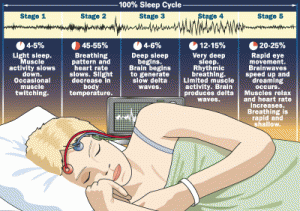An average person spends about 30% of his life in bed, depending on the kind of work he does or the kind of lifestyle he has. Sleeping habits are developed over a period of time. Some jobs that require long wakeful hours at night are one of the known causes of sleep deprivation in adults. Teens and youngsters usually stay up late hanging around with their buddies or watching nightly shows. Either way it will negatively affect our normal sleeping habits. It won’t take long before these sleep patterns become a part of their habit as the body tries to adapt to these unnatural changes. Oversleeping is just as bad because of the negative effects of too much inactivity.
How many hours of sleep is beneficial for well-being? Ideally, 7 to 9 hours is considered to be the best to have optimum results. But then again individual differences would mean that sleeping patterns will be different for every person. The best way to know if you’re getting enough sleep is that you don’t feel drowsy throughout the day. It’s like having yourself fully-charged and you feel like working all day. Of course, this is not necessarily true at all times, especially when you’re a bit under the weather or maybe when you’re in a boring meeting. In some countries, it’s natural to feel a little drowsy during midday or afternoon (“siesta”).
We all need to sleep right to maintain our well-being. We often dismiss the fact that sleep deprivation is scientifically and clinically proven to impair our body’s defenses and ability to recuperate from the wear and tear of our daily activities.
Importance of right amount of sleep
- Heart disease prevention. People who suffer from heart disease and stroke are known to have bad sleeping habits. Those with already high levels body fat and cholesterol are especially at risk. Having the right amount of sleep will help reduce the risk and promote a healthier heart.
- Cancer Prevention. Prolonged exposure to light at nighttime suppresses our body’s ability to produce melatonin and cortisol. This makes our body vulnerable to cancer cells. Women who are sleep deep deprived are very susceptible to certain cancers such as cancer of the breast.
- Sleep enhances brain activity. Needless to say, sleep makes us more alert and energized for the day. Sleeping improves brain functions and is a better alternative to caffeine or other stimulants that have negative side-effects.
As with any other activities, getting the best result comes from consistent effort. Same goes with our sleeping habits.
- Set a time for bedtime and getting up.
- Avoid irregular sleep patterns.
- Follow your sleeping and waking time religiously.
- Avoid stimulants in the evening.
- Do not exercise near bedtime.
- Keep the bedroom temperature comfortable.
If you have to make up for a lost sleep, you can take a nap early in the afternoon and it should not be more than 30 minutes. Soon enough, your body learn to adapt to these changes and restore your healthy sleeping habits.
Recommended Articles:



Hello there! This is my first visit to your blog! We are a group of volunteers and starting a new initiative in a community in the same niche. Your blog provided us useful information to work on. You have done a wonderful job!